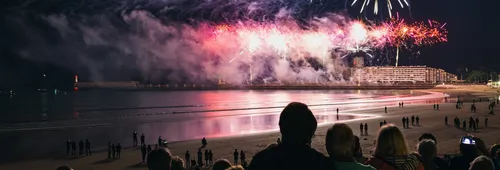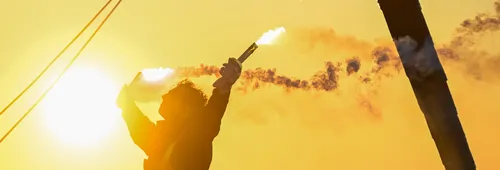The winds have been picking up since the morning and with it the speedos on the flying, foiling IMOCAs have climbed accordingly. On the afternoon of his 35th birthday British skipper Sam Goodchild (VULNERABLE) took the race lead again. Moving at more than 24 knots he will have had little time for cake and candles but his gift to himself is a margin which looks set to open up more. He was already nearly 30 nautical miles ahead of Jean Le Cam (Tout commence en Finistère- Armor lux) whilst third placed Seb Simon (Groupe Dubreuil) was matching Goodchild’s speed some 50 miles to the east.
Double Doldrums déja vu
But then from tomorrow at midday the leaders will hit the buffers again as they reach an active Doldrums zone which might take 24 hours to cross.
"We are picking up speed little by little. We are leaving this zone of light airs and no trade winds and now we are going to have wind all the way to the entrance of the Doldrums. Even if the last few days have been quite peaceful and really quite pleasant, it is nice to find some wind pressure again and to be going fast and in the right direction!”, enthused Clarisse Crémer.
“With the need to get out of the calm winds we are all still quite west. The situation is therefore very different to a normal race emerging out of the trade winds zone and as a result, I am not sure that there is a very specific strategy to be implemented. Our entry point into the Doldrums is, in a way, already a bit chosen for us by now.” Continued L’Occcitaine en Provence skipper Crémer who has taken a middle route.
After having spread out over more than 300 miles laterally the leading pack is starting to converge towards the same axis.
"We are all arriving more or less on the same line and we will probably enter the Doldrums spaced only tens of miles apart", added Crémer who knows that in this famous Inter Tropical Convergence Zone known for its meteorological instability, the slightest little gap or cloud can completely change the situation.
The Doldrums will be harsher for the leaders
“The leaders should enter tomorrow in the middle of the day and come out 24 hours later. As things stand, we can expect the leaders to deal with more activity, that is to say squalls, rain and so on than their pursuers," said Basile Rochut, the race's weather consultant.
"The Doldrums looks pretty challenging!" confirmed fifth placed Charlie Dalin (MACIF Santé Prévoyance), who added that he could see first cumulonimbus clouds appearing on the horizon. Not so for Jean Le Cam. At the easterly extreme, the south-eastern tip of the biodiversity protection zone of the Cape Verde archipelago, the skipper of Tout Commence en Finistère – Armor-lux is trying to ‘cut the cheese’ as the French say, attempting to cut a corner and rejoin the fleet.
"He positioned his gybe perfectly yesterday evening and, for the time being, he is exploiting all the capabilities of his daggerboard boat," noted Jacques Caraës, from Race Management.
Random….
"The Vendée Globe is great in that it offers a lot of freedom in strategic choices. Jean got through the light zone better than us and especially better than we imagined. I think he will cross the Doldrums at the same times as us, but in this zone, everything is always very random and can change very quickly. It is impossible to predict anything!”, commented Sébastien Marsset (Foussier) a feeling echoed on a video by Nicolas Lunven (Holcim – PRB) and many others who feel like having done one Doldrums an easier passage through the ‘real’ Doldrums might be merited.
Back in the game!
Meanwhile Hungarian skipper Szabi Weöres is back on the race course after making a painstaking repair to a tear in his mainsail. Knowing that he still has most of the globe to race round he was taking no chances in his repair. Speaking on the Vendée LIVE! English show he explained:
“It was quite a big one, I was working very hard the whole two days to get it fixed. It was a really big repair and so I hope I made a good job. The test is coming now. Also when you start to repair things you also recognise some other problems, I noticed I had lost one of my wind instruments at the top of the mast, probably when it was in the water. So I also had to replace that one, and I did some other small things and so I am back to sailing. I was really waiting for this time, wanting to be back at sea.”
The hole was about 2.5 metres high by 1.5 metres wide he explained, continuing “So about 4 metres or so of stitching, and then I was first of all using some Dyneema yarn, untwisted from a piece of rope, I was stitching the sails with this kind of diamond stitch, the purpose of which was to get the pieces very correct, exactly together, but it worked, it all came back to the same place, because it is very important that otherwise you create an area which would be very overloaded if you don’t position it correctly.”
“The other reason I used the Dyneema line was when you put the glue on top and some Sikaflex which goes very deep into the yarn, and then also gluing the yarn to the sails stops it moving. And It stops the chafe where the sail is stitched through. That took me one day to stitch the sail.
And on the second day I was putting on some Hydranet material, that is a Dyneema patch, glued with Sikaflex. Then I secured it all with another small patch. That was the mainsail job. And then I had to climb the mast to replace the wind sensor and take the halyard down as I did not take it with me when I cut the A7 off. And also made some small repairs to the furler. Now I am ready.”
And as he headed south today, upwind, he admitted “ I am very tired of this. It seems I will have calm conditions, maybe too calm. But I will have time to recover, to eat and then get some rest.”
But being moored in Las Palmas Grand Canaria naturally attracted a lot of attention:
“It was crazy. I knew I was in front of the webcam and lots of people were then coming around to see me, I had tell them not to come near, I don’t need any help, don’t touch me, stay awa or I will be disqualified from the race. People were coming close to the mooring line too and I was worried people would hook on the mooring line and get tangled. Luckily everything worked out.!”







